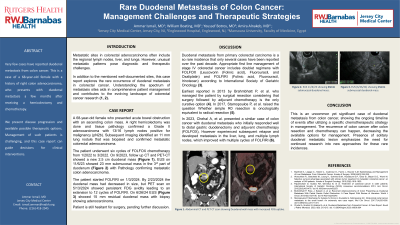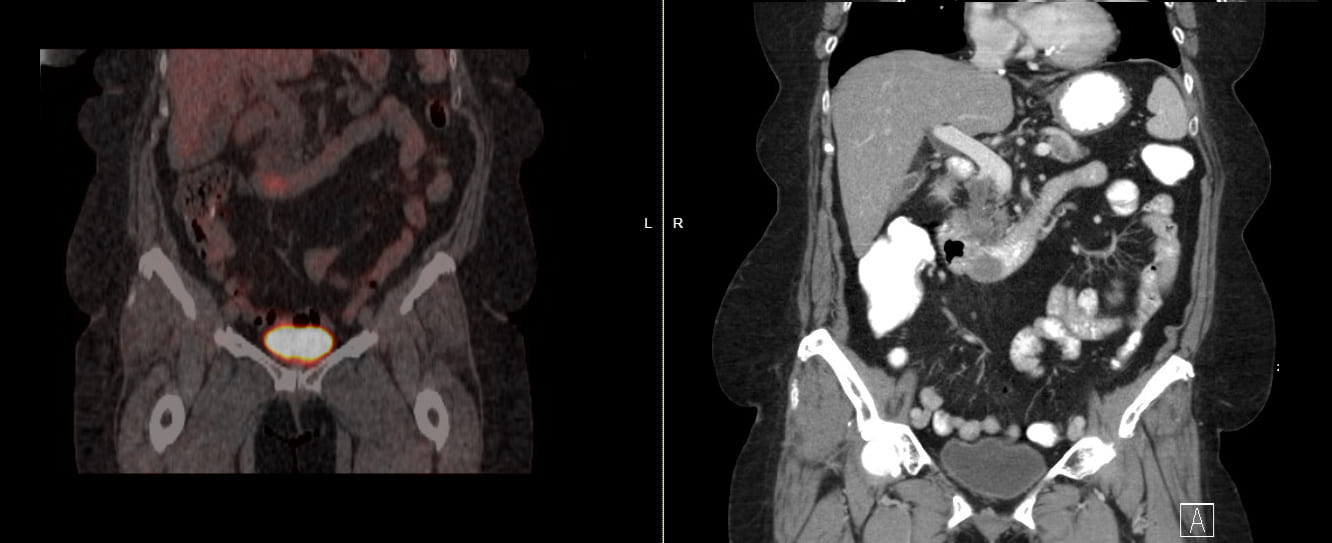Monday Poster Session
Category: Colon
P1961 - Rare Duodenal Metastasis of Colon Cancer: Management Challenges and Therapeutic Strategies
Monday, October 28, 2024
10:30 AM - 4:00 PM ET
Location: Exhibit Hall E

Has Audio

Ammar Ismail, MD
Jersey City Medical Center
Bayonne, NJ
Presenting Author(s)
Ammar Ismail, MD1, Amira Alnakeb, MD2, Youssef Botros, MD3, William KB. Boateng, MD1
1Jersey City Medical Center, Bayonne, NJ; 2Mansoura University, Bayonne, NJ; 3Jersey City Medical Center, Jersey City, NJ
Introduction: Metastasis of colon cancer to the duodenum is exceedingly rare, with only a handful of cases reported in the medical literature. This is a case of a 68-year-old female with a history of right colon adenocarcinoma, who presents with duodenal metastasis after receiving a hemicolectomy and chemotherapy. Very few cases have been reported demonstrating similar disease progression and therapeutic options. Management of such patients is challenging, and this case report can guide decisions for clinical interventions.
Case Description/Methods: A 68-year-old female presented with signs suggestive of bowel obstruction. A CT scan revealed an obstructing ascending colon mass, mesenteric lymphadenopathy, superior mesenteric vein thrombosis, and ascites. A right hemicolectomy and tissue pathology confirmed a Grade II adenocarcinoma with 13/16 lymph nodes positive for malignancy (pN2b). Subsequent imaging identified an 11 mm lung nodule that was confirmed metastatic colorectal adenocarcinoma with a biopsy two months later. The patient underwent six cycles of FOLFOX chemotherapy over three months. Eighteen months later, a new 2.5 cm duodenal mass was detected on follow-up CT and confirmed by a subsequent PET/CT to have F-fluorodeoxyglucose (FDG) avidity. EGD and EUS were performed and FNA cytology confirmed adenocarcinoma recurrence two months after detection. The patient started FOLFIRI chemotherapy and after a few months, the duodenal mass had decreased in size; however, a PET scan indicated increased FDG avidity three months later, leading to an extension to 12 cycles of FOLFIRI. Ongoing plans include a follow-up CT scan to assess the duodenum, followed by potential endoscopy and EUS if no mass is detected, ensuring comprehensive evaluation.
Discussion: This case highlights critical decisions in adapting chemotherapy options in duodenal metastasis from colon cancer. It underscores the importance of comprehensive monitoring and personalized plans, emphasizing the need for continued research into more effective therapeutic approaches. Current guidelines advocate initial chemotherapy, typically FOLFOX, for metastatic colon cancer, with surgical resection recommended for solitary metastases, particularly in the liver. However, there remains insufficient data regarding the management of solitary duodenal metastases, warranting further research and tailored clinical strategies.

Disclosures:
Ammar Ismail, MD1, Amira Alnakeb, MD2, Youssef Botros, MD3, William KB. Boateng, MD1. P1961 - Rare Duodenal Metastasis of Colon Cancer: Management Challenges and Therapeutic Strategies, ACG 2024 Annual Scientific Meeting Abstracts. Philadelphia, PA: American College of Gastroenterology.
1Jersey City Medical Center, Bayonne, NJ; 2Mansoura University, Bayonne, NJ; 3Jersey City Medical Center, Jersey City, NJ
Introduction: Metastasis of colon cancer to the duodenum is exceedingly rare, with only a handful of cases reported in the medical literature. This is a case of a 68-year-old female with a history of right colon adenocarcinoma, who presents with duodenal metastasis after receiving a hemicolectomy and chemotherapy. Very few cases have been reported demonstrating similar disease progression and therapeutic options. Management of such patients is challenging, and this case report can guide decisions for clinical interventions.
Case Description/Methods: A 68-year-old female presented with signs suggestive of bowel obstruction. A CT scan revealed an obstructing ascending colon mass, mesenteric lymphadenopathy, superior mesenteric vein thrombosis, and ascites. A right hemicolectomy and tissue pathology confirmed a Grade II adenocarcinoma with 13/16 lymph nodes positive for malignancy (pN2b). Subsequent imaging identified an 11 mm lung nodule that was confirmed metastatic colorectal adenocarcinoma with a biopsy two months later. The patient underwent six cycles of FOLFOX chemotherapy over three months. Eighteen months later, a new 2.5 cm duodenal mass was detected on follow-up CT and confirmed by a subsequent PET/CT to have F-fluorodeoxyglucose (FDG) avidity. EGD and EUS were performed and FNA cytology confirmed adenocarcinoma recurrence two months after detection. The patient started FOLFIRI chemotherapy and after a few months, the duodenal mass had decreased in size; however, a PET scan indicated increased FDG avidity three months later, leading to an extension to 12 cycles of FOLFIRI. Ongoing plans include a follow-up CT scan to assess the duodenum, followed by potential endoscopy and EUS if no mass is detected, ensuring comprehensive evaluation.
Discussion: This case highlights critical decisions in adapting chemotherapy options in duodenal metastasis from colon cancer. It underscores the importance of comprehensive monitoring and personalized plans, emphasizing the need for continued research into more effective therapeutic approaches. Current guidelines advocate initial chemotherapy, typically FOLFOX, for metastatic colon cancer, with surgical resection recommended for solitary metastases, particularly in the liver. However, there remains insufficient data regarding the management of solitary duodenal metastases, warranting further research and tailored clinical strategies.

Figure: CT and PET CT of the abdomen showing duodenal mass with increased FDG activity
Disclosures:
Ammar Ismail indicated no relevant financial relationships.
Amira Alnakeb indicated no relevant financial relationships.
Youssef Botros indicated no relevant financial relationships.
William Boateng indicated no relevant financial relationships.
Ammar Ismail, MD1, Amira Alnakeb, MD2, Youssef Botros, MD3, William KB. Boateng, MD1. P1961 - Rare Duodenal Metastasis of Colon Cancer: Management Challenges and Therapeutic Strategies, ACG 2024 Annual Scientific Meeting Abstracts. Philadelphia, PA: American College of Gastroenterology.

